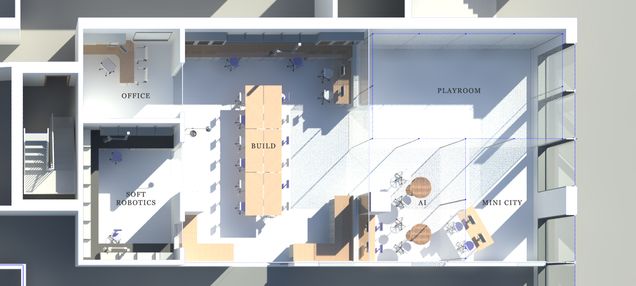ENG Awarded MassTech Grant to Build Robotics Lab
By Michael Seele
The Massachusetts Technology Collaborative has awarded a $4.4 million grant to the College of Engineering to construct a new robotics lab focusing on graduate education at the master’s degree level. Boston University is contributing another $4.4 million, bringing the overall investment to $8.8 million over three years. The grant will fund the development of the Robotics & Autonomous Systems Teaching and Innovation Center (RASTIC), a hands-on robotics teaching facility that is expected to complement the College’s master’s degree program in Robotics & Autonomous Systems and enhance robotics capstone experiences for undergraduate students.
Mass Tech is an industry collaborative that aims to support high tech and related industries in Massachusetts. It chose ENG among many other applicants largely based on the College’s strong partnerships with industry and its ability to supply the workforce with qualified graduates who can make an impact in this rapidly emerging field. Mass Tech was also attracted by the College’s cutting-edge research in artificial intelligence (AI) for robotics, largely coordinated by the Center for Information and Systems Engineering (CISE), and by the role the new Center for Computing & Data Sciences (CDS) will play in the College’s robotics program.

“The College’s strategic plan emphasizes creating societal engineers who recognize the power of synthesizing perspectives and ideas from multiple disciplines to innovate impactful solutions for societal challenges,” said Dean Kenneth Lutchen. “To accomplish this, we recognize the critical need to build cutting-edge facilities informed by our deep partnership with industry to ensure that our graduates have the skills and experiences they need to thrive.”
Lutchen noted that over the past several years, the College has identified Robotics & Autonomous Systems as a core strategic area of strength and created a Master of Science program in the discipline. In discussions with industry leaders, Lutchen said, it became clear that Massachusetts was emerging as a major hub of robotics, particularly those that integrate machine learning, AI and deep learning, with applications ranging from autonomous cars to warehouses to soft robotics used in medical applications. They also said there is a strong need for engineers to keep the Massachusetts robotics industry at the leading edge.
While the College established a robotics laboratory in the rear of the Engineering Product & Innovation Center several years ago, it was built as a research facility. RASTIC is intended to support the education of master’s students and offer a maker space for undergraduates pursuing capstone projects in robotics. Professor Ioannis Paschalidis (ECE, BME, SE, CDS) spearheaded the grant application, along with Professor Sean Andersson (ME, SE), director of the M.S. program in Robotics & Autonomous Systems. They noted that the lab is designed to be flexible and adjust to the developments in technology and evolving industry needs.
 The 2,000-square-foot space will feature a robotics “playroom,” where experiments with ground and air robots will be conducted. Next to that will be a mini-city layout, where students can experiment with miniature self-driving vehicles. RASTIC will also include a build area, where student teams can collaborate to assemble custom devices. An AI space will host powerful servers to develop algorithms that act as the brain center of the deployed robots. An important part of the lab will be a soft robotics area for the development of new devices made from highly flexible materials.
The 2,000-square-foot space will feature a robotics “playroom,” where experiments with ground and air robots will be conducted. Next to that will be a mini-city layout, where students can experiment with miniature self-driving vehicles. RASTIC will also include a build area, where student teams can collaborate to assemble custom devices. An AI space will host powerful servers to develop algorithms that act as the brain center of the deployed robots. An important part of the lab will be a soft robotics area for the development of new devices made from highly flexible materials.

“Two elements make RASTIC unique,” said Paschalidis, who is also director of CISE, which will manage RASTIC. “For one, AI is bound to revolutionize robotics, and we have a critical mass of faculty and large federally funded projects supporting such research. The growth of computing and data sciences on campus will multiply these efforts. Further, our emphasis on soft robotics, with its great potential in medical applications, is on the forefront of the field.
“RASTIC will develop into a fantastic conduit through which cutting-edge research conducted at BU will get translated into projects of interest to the Massachusetts robotics industry, while educating the workforce of tomorrow in the process,” he added.
Associate Provost for Computing & Data Sciences Azer Bestavros noted the University’s commitment to advancing the impact of data science on all aspects of society, as demonstrated by the center’s new 19-story building rising on Commonwealth Avenue and the establishment of the Faculty of Computing & Data Sciences (CDS), which includes many affiliated members from the College of Engineering.
“Clearly, a major application area for CDS is to leverage the strength of the College of Engineering in robotics and systems engineering, specifically focusing on machine learning and artificial intelligence approaches that will power the brains of the next generation of autonomous and robotics systems,” Bestavros said. “We also anticipate that new CDS data science degree programs will attract students who can contribute to the robotics industry in Massachusetts, and whose preparation will be greatly enhanced by hands-on projects in RASTIC in collaboration with industry.”